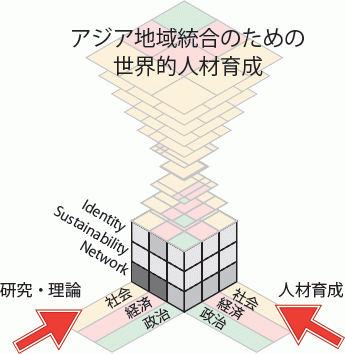Fostering Well‐Rounded and Highly‐Specialized Human Resources Able to Promote Regional Interests
GIARI Method
The GIARI method is a systematic and structured educational program that performs a mutually complementary role alongside the GIARI model for research. The GIARI method is more than just an attempt to bring cutting‐edge research findings into an educational program. Rather, it focuses on helping students become aware of the interdisciplinary relationships between their own area of specialization and other academic disciplines.
Students are encouraged to be aware of where they are anchoring their studies, in terms of interlinking locations throughout differing disciplines, even within complex research fields such as the integrated discipline of Asian regional studies. Students can also become familiar with diverse disciplines, and develop a consideration for and an understanding of the interdisciplinary aspects of other fields.
GIARI Method: Concepts
A 3x3x3 matrix, comprising the three key concepts behind the GIARI method, and the three disciplines which GIARI encompasses, forms a conceptual cube; on the left side is research, reflecting the findings of GIARI‐driven studies. On the right side is the cultivation of human resources; this displays the level of richness of curriculum provided at each graduate school, including GSAPS. The shading in each cell depicts the research/education performance level of Asian regional interaction in those fields where individual concepts overlap. For example, the lightly shaded areas on the research side show how substantial research has yet to be accumulated, while darkly shaded areas show fields with significant performance and continued promise.

GIARI Method
3‐Step Process for Fostering Strong Human Resources
GIARI follows a three‐step process for fostering strong, adaptable and highly‐specialized human resources, able to focus on regional cooperation and integration throughout Asia whilerealizing regional interests.
Step One: Encourage Interest amongst All Graduate Students
All students are encouraged to take part in symposia, workshops and WUDSN events held by GIARI, thus helping to heighten the interest of all graduate students in issues of Asian regional integration and cooperation.
Step Two: Train Collaborators in Regional Integration
The GSAPS MA program includes courses designed to equip students with fundamental knowledge and methodological theory on Asian integration (Seminar on Asian Integration, Qualitative and Quantitative Methodology on Asian Integration); this provides students with the opportunity to learn about the specialized and composite nature of regional integration‐based research before embarking on a doctoral program. PhD program students have access to the Research and Survey Assistance Scheme, which provides financial support to take part in field work and international academic conferences on Asian regional integration.
Step Three: Train Core Facilitators of Integration: Well‐Rounded and Highly‐Specialized Human Resources
Special Asia Fellows, well‐versed in both the overall and specific regional contexts of Asian integration, are employed as RAs with a view to their future key role as intellectual leaders capable of designing schemes for forthcoming regional integration. They undergo intensive training in how to write academic papers in the English language, instructed by American visiting professors. From FY2009, Global COE‐based Assistant Professors (Junior Researchers) have also been employed. This new staff is expected to form the core membership for constructing a new theory of integration.
Toward the Training of Intellectual Leaders Able to Act Globally
GIARI is also focused on training human resources bound for governmental and international organizations, capable of becoming the next generation of leaders responsible for regional integration. Students are provided with ample opportunity to build their international experience, such as presenting reports at international academic conferences and undertaking internships at international organizations; this encourages the coordinating of skills and policy development capabilities. Going forward, this will function to strengthen integration alongside international organizations, ASEAN, and other pan‐Asian organizations.
WUDSN: Voluntary Network of Graduate Students
The Waseda University Doctoral Student Network (WUDSN) is a doctoral student networking organization founded in September 2006 by a GSAPS doctoral student. Based on the Association of Pacific Rim Universities (APRU) Doctoral Students Conference, it holds research meetings where doctoral students present their findings, mostly in English, to other researchers within Waseda University.
Seminars take place around once a month; doctoral students are able to form horizontal networks, of course, but also vertical networks with more experienced researchers, governmental employees, business people, and so on. WUDSN activities are fully supported by GIARI, together with GSAPS.
